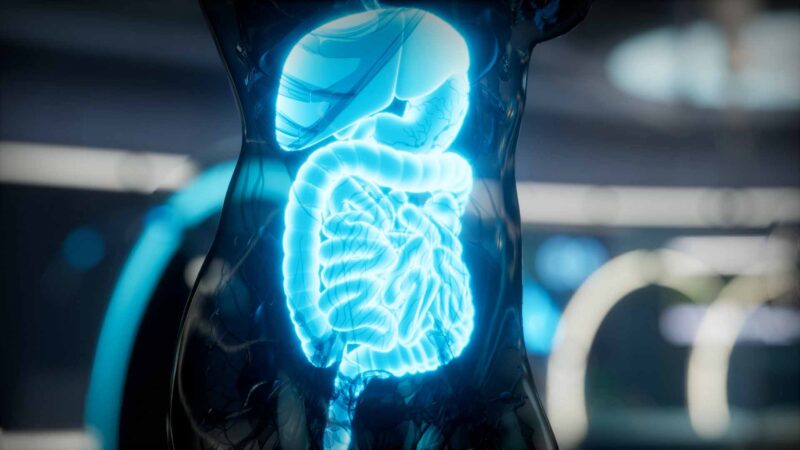LARGE SCALE GENETIC STUDY FINDS NEW LINK BETWEEN IRRITABLE BOWEL SYNDROME & CARDIOVASCULAR SYSTEM
With
Dr. Leticia Camargo Tavares,
Postdoctoral Scientific Researcher
Hypertension Laboratory,
School of Biological Sciences
Monash University, Clayton, Victoria, Australia
Professor Mauro D’Amato,
Professor of Medical Genetics,
Department of Medicine and Surgery,
LUM University in Casamassima, Italy &
Ikerbasque Research Professor and
Head of the Gastrointestinal Genetics Lab,
CIC bioGUNE, Derio, Spain
CASE STUDY
Filmed in Clayton, Victoria, Australia & Online | May 2025
Research published April 2024 in the journal Cellular and Molecular Gastroenterology and Hepatology sheds light on disease mechanisms common to irritable bowel syndrome (IBS) and cardiovascular diseases (CVD).
Led by Dr Leticia Camargo Tavares, a Postdoctoral Fellow at the Hypertension Research Laboratory within Monash University’s School of Biological Sciences, the study revealed novel insights into the genetic underpinnings of IBS, offering potential avenues for therapeutic intervention.
IBS is one of the most prevalent gastrointestinal disorders globally, affecting up to 10 per cent of the population, with a disproportionate impact on women.
It is characterised by a complex range of symptoms including abdominal pain, bloating, diarrhea and constipation. IBS significantly compromises patients’ quality of life. Despite its widespread prevalence, the cause of IBS remains unclear, thus limiting treatment options.
An international consortium of researchers, drawing expertise from Monash University (Australia), CIC bioGUNE (Spain), LUM University, IRGB-CNR, CEINGE, and the University of Naples Federico II (Italy), as well as the University of Groningen (Netherlands), embarked on a comprehensive investigation.
Analysing data from two large European population cohorts — UK Biobank and Lifelines — the team scrutinised the genetic landscapes of 24,735 people with IBS and 77,149 symptom-free individuals.
Their analysis uncovered four genomic regions, including two previously unidentified loci, associated with increased susceptibility to IBS.
These genetic hotspots implicate pathways central to gastrointestinal motility, intestinal mucosal integrity, and circadian rhythm regulation.
“Although we’re yet to conclusively pinpoint specific genes and mechanisms, these findings provide novel insights into IBS pathophysiology, highlighting potential therapeutic targets. So, we expect follow-up research to build on these discoveries,” Dr Tavares said.
Moreover, the researchers found a link between IBS predisposition and various cardiovascular ailments, encompassing hypertension, ischemic heart disease, and angina pectoris.
Professor Mauro D’Amato, senior author and study supervisor from CIC bioGUNE and LUM University, described this new evidence as the most exciting outcome, underscoring the potential for shared therapeutic modalities.
In another important finding, the study revealed that IBS heritability (the weight of genes in determining one’s risk of disease), might be higher than previously thought. This, the authors say, may stem from their adherence to standardised classification criteria in delineating IBS phenotypes, notably the Rome Criteria from the Rome Foundation.
Source: Adapted from Monash University media release
You Might also like
-
Engineering bacteria to detect colorectal cancer cells
An international team of researchers from Adelaide and the United States has engineered bacteria capable of detecting mutated DNA released from colorectal cancer cells, opening the door to faster disease detection.
-
Better biomarkers for predicting the incidence of having atherosclerosis and heart attack
Assoc Prof Bursill is a vascular biologist with interests and expertise in vascular inflammation, atherosclerosis and angiogenesis. She completed her PhD at The University of Adelaide in lipid metabolism then headed to Oxford University for five years to undergo a postdoctoral post in the Departments of Cardiovascular Medicine and Pathology. Her postdoctoral time triggered her interest in the mechanisms that cause atherosclerosis and in particular the role of small inflammatory proteins called chemokines.
-
Biological interactions of extracellular vesicles
Raluca Ghebosu graduated from the University of Queensland with a Bachelor of Arts/Bachelor of Science with majors in Japanese and Biomedical Science (2018-2021). She then completed her Bachelor of Science (Honours) with the School of Biomedical Sciences at the University of Queensland in 2022, before pursuing a PhD with A/Prof. Joy Wolfram at the Australian Institute for Bioengineering and Nanotechnology.



